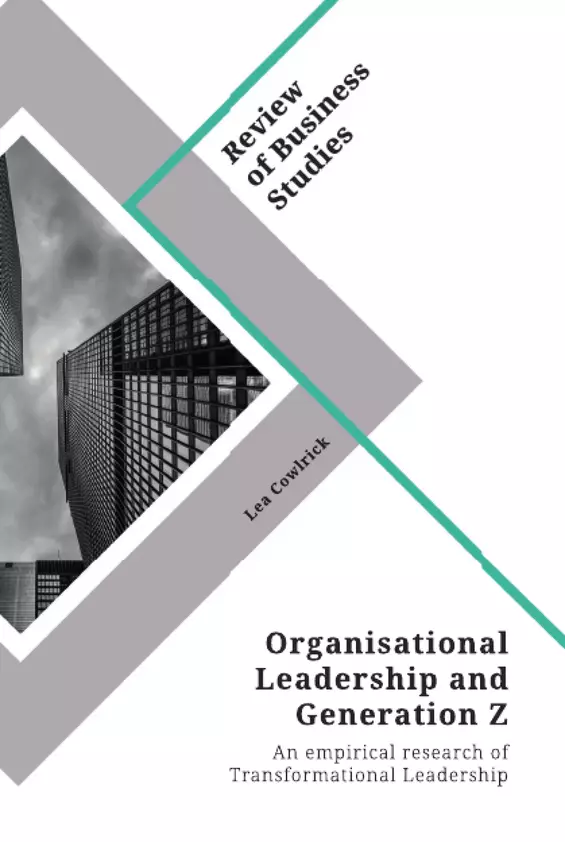Generation Z are individuals born between 1995 and 2010 who are growing up in a digital work. However, Transformational Leadership is a relatively recent theory of leadership, shown to be effective across various industries. Leaders who cultivate a Transformational Leadership style are able to work together with their followers towards higher goals and shift expectations and perceptions. Thus, this thesis was initiated to test the hypothesis that Transformational Leadership theory is effective for Generation Z.
A web-based survey based on Transformational Leadership was designed to assess Generation Z’s expectations of effective leadership. Therefore, 15 statements were individually assessed and then grouped together into the 5 dimensions of Transformational Leadership to determine if Generation Z expressed more importance for any specific dimension. Finally, a depth interview was designed based on the Transformational Leadership theory to see how leaders incorporate Generation Z’s expectations effectively into their organisation.
A total of 147 respondents from Generation Z answered the survey with 15 statements. Statements with the most important expectations were ‘’a leader should promote his followers’ further development’’ and ‘’a leader should have confidence in their followers’’. When all 15 components were put together to form the five dimensions of Transformational Leadership, the following dimensions were most important to Generation Z: Inspirational Motivation and Idealized Influence Attributes. Further analysis showed that Idealized Influence Behaviour becomes increasingly important with more working experience. Furthermore, three managers were selected for depth interviews from the aviation industry, automotive industry, and an educational foundation for disadvantaged children. The depth interviews provided feedback showing that managers acknowledge Generation Z’s values and that there are different approaches for leading Generation Z. Generation Z offers their workforce a number of opportunities such as their flexibility, readiness for change and openness to digitalisation. On the other hand, Generation Z need more attention and leadership support.
Inhaltsverzeichnis (Table of Contents)
- Introduction
- Objectives and research questions
- Approach and limitations
- Theoretical framework
- Leadership
- Definition
- The purpose of leadership
- The impact of leadership in organisations
- Leadership across cultures
- The history of leadership
- The trait era
- The behaviour era
- The contingency era
- The current era
- Transformational Leadership
- Background and Definition
- The Full Range Leadership Model
- The Multifactor Leadership Questionnaire
- Research on Transformational Leadership
- Generation Z
- Environment
- Generation Z's values
- Generation Z's key characteristics
- Generation Z's working expectations
- Current state of research
- Empirical quantitative research
- The survey
- Choice of study design
- Construction of survey
- Execution of survey
- Presentation of the survey's results
- Survey analysis
- What does Generation Z expect from effective leadership?
- Does Generation Z think that different dimensions of Transformational Leadership have more importance than others for effective leadership?
- The survey
- Empirical qualitative research
- The interviews
- Choice of study design
- Construction of interviews
- Execution of interviews
- Presentation of the interview's results
- Interview analysis
- The interviews
- Discussion
- Future consideration and conclusion
- Future consideration
- Conclusion
Zielsetzung und Themenschwerpunkte (Objectives and Key Themes)
This thesis aims to investigate the effectiveness of Transformational Leadership theory for Generation Z. It explores the expectations Generation Z holds regarding effective leadership and examines how these expectations are incorporated into organizational practices.- Transformational Leadership
- Generation Z's expectations of leadership
- Effective leadership in organizations
- The influence of generational characteristics on leadership styles
- The role of leadership in shaping organizational culture
Zusammenfassung der Kapitel (Chapter Summaries)
The introduction provides an overview of the research topic, outlining the objectives and research questions. It delves into the theoretical framework, exploring the concept of leadership, its evolution, and the emergence of Transformational Leadership. The second chapter focuses on the concept of leadership, exploring its definition, purpose, impact in organizations, and cross-cultural variations. It provides a historical overview of leadership theories, emphasizing the development of Transformational Leadership. The third chapter explores Generation Z, outlining their values, key characteristics, and working expectations. It examines the impact of their digital environment and their unique perspective on work and leadership. The fourth chapter delves into the empirical quantitative research methodology employed in the thesis. It discusses the survey design, construction, and execution, presenting the results and conducting a comprehensive analysis. The fifth chapter explores the empirical qualitative research, focusing on the interviews conducted with managers. It discusses the design, construction, and execution of the interviews, presenting the results and conducting an in-depth analysis. The sixth chapter provides a detailed discussion of the findings from the quantitative and qualitative research, drawing connections and highlighting key insights.Schlüsselwörter (Keywords)
This thesis focuses on the intersection of leadership, generational differences, and organizational practices. Key concepts include Transformational Leadership, Generation Z, effective leadership, generational values, and leadership styles. It explores the relationship between leadership and organizational success, particularly within the context of a rapidly evolving workforce.Frequently Asked Questions
What does Generation Z expect from a leader?
Generation Z values leaders who promote their further development and show genuine confidence in their followers' abilities.
Is Transformational Leadership effective for Generation Z?
Yes, the study indicates that Transformational Leadership dimensions, especially Inspirational Motivation, align well with the expectations of this digital generation.
Which leadership dimensions are most important to Gen Z?
The research highlights "Inspirational Motivation" and "Idealized Influence Attributes" as the most critical dimensions for effective leadership from their perspective.
How does work experience change Gen Z's leadership expectations?
As members of Generation Z gain more working experience, the dimension of "Idealized Influence Behaviour" becomes increasingly important to them.
What are the strengths and needs of Gen Z in the workforce?
Strengths include flexibility and openness to digitalization, while their needs include more frequent attention and direct leadership support.
- Quote paper
- Lea Cowlrick (Author), 2020, Organisational Leadership and Generation Z, Munich, GRIN Verlag, https://www.grin.com/document/974870



